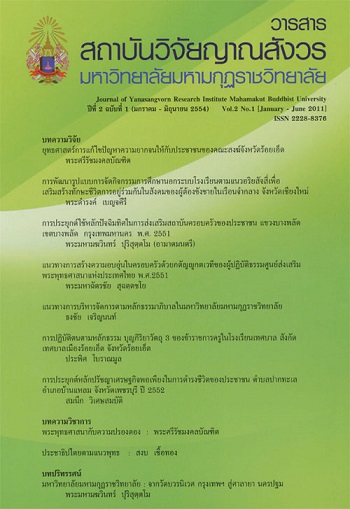Development of Non-Formal Education Activities Based on The Four Noble Truths Principle to enhance life skills for living together of Male Inmates in Chiangmai Central Prison
Main Article Content
Abstract
This research article was to propose the Non-Formal Education activities, having the purposes to create and test an application of Non-Formal Education activities in accordance with the Four Noble Truths principle to enhance life skills for living together in society of the male inmates in the Chiangmai Central Prison. This study applied qualitative and the semi-trial methodologies and recruited by random sampling through ticket drawing. There were a group of volunteers participating in the activities in the Chiangmai Central Prison during the course of 11 days totalling 116 hours ,and assessing the pre-test and after test with t-test at the statistical significance at 0.05. The major findings were found that there were a significant improvement of life skills in five fields at the statistical significance at 0.05 and male inmates had high satisfaction in all activities and self – assessment revealed that the majority of male inmates had practiced a variety of daily activities in which the test had gained the format of activities in accordance with the Four Noble Truths. Besides, the male inmates had suggested that these activities should be applied and made known to the inmates in the other places.
Article Details
References
วีรฉัตร สุปัญโญ. การวางแผนการเรียนการสอนการศึกษานอกระบบ. ประมวลสาระชุดวิชาการเรียนการ สอน การฝึกอบรมและการพัฒนาสื่อการศึกษานอกระบบ หน่วยที่ 3. นนทบุรี : สำนักพิมพ์มหาวิทยาลัยสุโขทัยธรรมาธิราช, 2545.
ราชทัณฑ์, กรม. นโยบายเน้นหนักกรมราชทัณฑ์ ประจำปีงบประมาณ พ.ศ. 2550 [ออนไลน์]. 2550. แหล่งที่มา: webmaster@correct.go.th
ราชทัณฑ์, กรม. แผนปฏิบัติการพัฒนาระบบบริหารความรู้ภายในกรมราชทัณฑ์ ประจำปี 2548 กรมราชทัณฑ์ กระทรวงยุติธรรม. [ออนไลน์]. แหล่งที่มา: www.correct.go.th/comnet1/plan/plan25.
ศึกษาธิการ,กระทรวง.พระราชบัญญัติส่งเสริมการศึกษานอกระบบและการศึกษาตามอัธยาศัย ม.ป.ท., 2551
ศึกษาธิการ,กระทรวง.สำนักงานเลขาธิการสภาการศึกษา.พระราชบัญญัติการศึกษาแห่งชาติ พ.ศ.2542 และที่แก้ไขเพิ่มเติม (ฉบับที่ 2) พ.ศ. 2545. กรุงเทพมหานคร : พริกหวานกราฟฟิค, 2545.
สุขภาพจิต, กรม. คู่มือกลุ่มบำบัดเพื่อพัฒนาทักษะชีวิตสำหรับกลุ่มเสี่ยง.พิมพ์ครั้งที่ 1 นนทบุรี: สำนักพัฒนากรมสุขภาพจิต. 2541.
สุขภาพจิต, กรม. รายงานการประชุมวิชาการเรื่อง ทักษะชีวิตและการเรียนรู้แบบมีส่วนร่วม.สำนักพัฒนาสุขภาพจิต กรมสุขภาพจิต กระทรวงสาธารณสุข, 2541.
สุขภาพจิต, กรม. สำนักพัฒนาสุขภาพจิต. คู่มือกลุ่มบำบัดเพื่อเสริมสร้างทักษะชีวิต สำหรับนักเรียนที่มีพฤติกรรมใช้สารเสพติด. พิมพ์ครั้งที่ 2. กรุงเทพฯ: ศรีเมืองการพิมพ์, 2543.
สุขภาพจิต, กรม. สำนักพัฒนาสุขภาพจิต. คู่มือการสอนทักษะชีวิตเพื่อป้องกันสารเสพติดในสถานศึกษา : ระดับมัธยมศึกษาตอนปลาย. นนทบุรี : กรมสุขภาพจิต กระทรวงสาธารณสุข, 2542.
รุ่งกานต์ ศรลัมพ์. การฝึกอบรมวิทยากรโรคเอดส์เชิงคุณภาพ. [ออนไลน์]. 2541. แหล่งที่มา : www.scphub.ac.th/ulib/searching.php%3.
สุรสีห์ อินอุ่นโชติ. พฤติกรรมการใช้ยาเสพติดของผู้ผ่านการฝึกอบรมตามโครงการแสงเทียน. วิทยานิพนธ์ปริญญามหาบัณฑิต, มหาวิทยาลัยขอนแก่น,2554.
อาชัญญา รัตนอุบล. การจัดโปรแกรมการศึกษานอกระบบโรงเรียน. กรุงเทพมหานคร: สาขาวิชา การศึกษานอกโรงเรียน คณะครุศาสตร์ จุฬาลงกรณ์มหาวิทยาลัย, 2550. (อัดสำเนา)
Caffarella, R.,S. Planning Programs for Adult Learners. San Francisco: Jossey- Bass Publisers, 1994.
Mezirow,J.D.Transformative Dimensions of Adult Learning.San Francisco:Jossey-Bass,1991.


